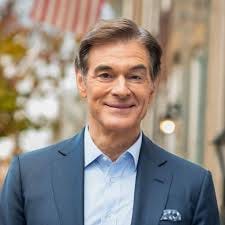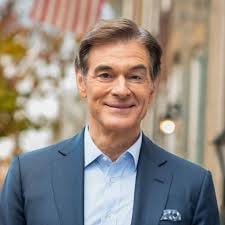I graduated with my A.B. from Columbia College in New York City. For the 40th anniversary of our class in 2009, all the various classes were offered the chance to hear seminars by prominent speakers on topics in the arts, sciences, and other fields. I noted an interesting seminar which was about cardiac health if I recall.
Coming into the hall early, I met a well dressed man with a stylish briefcase. He said, “There’s supposed to be a medical talk around here. Is this the right place?” I said that it was, and that we were both a little early, but I wanted to get a good seat. I pointed him to the entrance of the theater-style auditorium.
As it filled up with around 160 people, the lights came on and the man whom I met strode onto the stage and introduced himself as Dr. Mehmet Oz! My notes from that day, recounted below, say that he was Chief of Cardiothoracic Surgery at the New York Presbyterian Columbia Medical Center as well as being a Professor at the Medical School, where he taught residents.
Dr. Oz mentioned to his residents the importance of “learning how to learn.” For identifying the high potentials who could become future faculty members, what was important to him was (1) Can they write?, and (2) Can they listen? Since I was the CFO for a high growth medical device company and an adjunct professor in an MBA program, I found these insights useful.
Dr. Oz was the physician on the Oprah Show for five years, and his goal was to turn his medical knowledge and clinical experience into useful information for a broader population,so so that they could then go out and become apostles for encouraging people to take charge of their preventative care and to lead healthier lives. “When patients come to me, it’s too late,” he said without drama. I had never heard a cardiac doctor speak this way. Given that my own concerns about my condition and lifestyle, needed some actionable ideas; I was scribbling as fast as I could on a blank page from a small brochure.
Dr. Oz was grateful to Miss Winfrey for giving him the platform to propagate his ideas. He then mentioned that the Discovery Channel would soon be creating a Discovery Health Channel on which there would be a “Dr. Oz Show.” The audience erupted with applause.
He used a “need to treat” approach to looking at Lipitor and statins, which were being used for prevention and cardio protection at low doses, and at high doses for patients like me. Dr. Oz said that 160 people would have to be on lifetime preventative treatment with Lipitor to prevent one cardiac death, which is a very expensive way of saving one life. Are there better things a consumer can do to take charge of their own health care and to get better advice?
1. Pick Dr. Right for your primary care physician
2. Pick the best hospital for your admissions
3. Be safe in hospital as far as infections, and follow instructions
4. Be compliant with your medication regimen
5. Get a second opinion before any major surgery
o From his experience, only 10% of patients do this; he felt that most are afraid of offending their primary physician.
o 1/3 of the time the second opinion impacts or changes the diagnosis. At Columbia, Dr. Oz noted in 20% of the second opinions, the recommendation is that the patient NOT have any procedure done.
I’m going to summarize some of the other areas which Dr. Oz highlighted in his seminar, along with some actionable suggestio, all of which are eminently reasonable.
1. Blood pressure is cited as the number one correlative of rapid aging. He suggests checking target ranges for BP given age. He suggests walking for thirty minutes a day as an actionable item.
2. Waist size, particularly for men, is an excellent predictor of future health problems. The quick measure he suggested was to take height in inches/2 as an appropriate target for a man’s waist size. Dr. Oz described the omentum, or yellow fat pad which can develop around the organs as waist circumference increases.
3. For dietary suggestions, he mentions oatmeal for breakfast, which increases soluble fiber in the gut. Anything which helps the body to properly signal satiety is worth trying, like eating more slowly. Dr. Oz in 2004 was clear about eliminating high fructose corn syrup, by watching for it as a food additive. Dr. said that it blocks messages to the brain that you are full and don’t need to eat any more. He suggests eating a handful of nuts, like almonds, just before a meal, saying that the stomach will start churning and the movement of food through the gut will be slowed.
4. Dr. Oz mentions the importance of good sleep hygiene. Ideas include a regular time, a darkened room, without noise and on the cool side. This topic has become even more prominent with the presence of blue lighted screens from mobile phones in bedrooms, so for me this topic was new in 2004.
5. He reiterated the importance of Omega 3 fatty acids for health which was becoming commonplace. Dr. Oz added a proviso that the consumer should look for vegetarian sources as opposed to fish.
6. Little adjustments to diet are suggested, like eating 125 calories less than usual; my notes aren’t clear, but 125 calories are about 6% of the 2,000 calorie average daily intake. Calorie restriction, by volume of food or mix between carbs, fats, and protein are a part of many good lifestyle plans, so this is a very doable tactic. Dr. Oz suggests a weight change may come as will also a change in hunger signals. Reducing BMI by 5% appears also.
Mehmet Oz completed his undergraduate degree at Harvard College, and then did his M.D. at University Pennsylvania School of Medicine, along with an MBA. He began his surgical residency at Columbia Irving Medical center and rose up to his position as Chief of Cardiothoracic Surgery.
I cannot see any basis anywhere, dating back to my 2004 encounter with Dr. Oz to the present who can call his medical training, understanding, or medical surgical results into question with evidence where the data can be examined.
Certainly, it became evident to me over time that something had changed with Dr. Oz. What was it? The bugaboo of many a successful older man: divorce. It must have been a blow to his emotions and very expensive. Ask Bill Gates. Ask Sergey Brin. Ask many, many public company CEOs. Divorce is very common, but multibillionaires and the CEOs can shrug the financials off. Dr. Oz, with his Wharton MBA knew where sources for levering up his income were limited.
This must have begun the period where he began hustling GNC or television infomercial style supplements because the margins on this stuff are huge. Sadly, the shelves will have a lot of snake oil with dubious claims.
For his colleagues at Columbia, did you treat him as a colleague and fellow practitioner? Did they go to him quietly, confidentially and talk about the reputational repercussions of these kinds of unregulated supplements on Columbia and ask for his thoughts? If necessary, put something in writing. Once someone goes to the press, their professionalism, ethics, emotional intelligence, and motives are all impugned. Players like the New York Times, CNN, NPR, and lower down the search page will each pursue their own remunerative agendas. They are not truth seekers.
Trolls say Dr. Oz had a “checkered record in health care.” If that means his foray into selling supplements and recommending them without evidence, yes that would be a churlish formulation.
However, nothing in his medical record or qualifications suggests that he couldn’t handily discharge a position in the Trump administration related to healthcare. Actually, his combination of his M.D., his knowledge of insurance markets from his surgical practice, and his Wharton MBA make an order of magnitude better fit than another Washington attorney.




